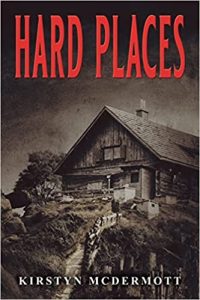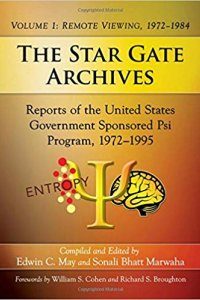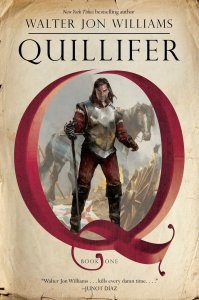Ian Mond Reviews Hard Places by Kirstyn McDermott
 Hard Places, Kirstyn McDermott (Trepidatio 978-1-68510-057-5, $22.95, 312pp, tp) July 2022.
Hard Places, Kirstyn McDermott (Trepidatio 978-1-68510-057-5, $22.95, 312pp, tp) July 2022.
The year was 1994 and I was attending the monthly meeting of the Melbourne Horror Society at the Māori Chief Hotel in South Melbourne. Issue #3 of Bloodsongs – Australia’s first professional horror fiction magazine – had just been released, and the members, which included the periodical’s two editors, were poring over copies and discussing the content. Sitting across from me at one of the tables was a new member, a young woman around my age dressed mostly in black. Before I had a chance to introduce myself, she asked me what I thought of “And the Moon Yelps”, one of the stories featured in the issue. I told her that I loved it, that I thought it was one of the best, if not the strongest piece, in the magazine. “I’m glad you thought so,” she said, “because I wrote it.” This is how I met Kirstyn McDermott. Twenty-eight years later and we remain close friends; we even host a podcast together (it’s called The Writer and the Critic; I may have mentioned it a few hundred times in this column). I’ve never really given much thought to what might have happened if I’d told Kirstyn that I didn’t like “And the Moon Yelps”. But then, I can’t imagine a possible universe where I didn’t love that story or the horror and dark fantasy she has written since. Now, with the publication of Hard Places, a curated collection of her short fiction, I have the pleasure of revisiting her work.
Hard Places gathers together 14 stories: 13 of which were published in the last two decades, and the titular final story, which is original to the collection. The opening piece, “She Said”, is a tale about a sickly young woman, Mallory (with “skinny ribs hitching high” and a cough “harsh and hacking”), who has given everything of herself (she spat “something dark and clotted into the jar”) to inspire the paintings of her artist boyfriend Josh (“You’ll need this,” she said. “For the clouds”). Little does Mallory know, as she fades away in bed, that Josh is having an affair with and painting the portrait of Fiona, who has “ash-gold curls and a grin coaxed straight from a fairy tale.” “She Said” brilliantly showcases McDermott’s prose, rich in alluring and visceral imagery. “Painlessness” is similar in effect. The story is told from the perspective of Faith, recently arrived in Melbourne, who discovers – in disturbing fashion – that Mara, the woman in the apartment next door, lets men torture and abuse her for money because she doesn’t feel pain. As with “She Said”, the brutality of the central premise is not so much lessened as ameliorated by the strength of McDermott’s prose, lyrical and evocative and, when necessary, sharp like a razor.
McDermott readily acknowledges in the notes that cap off the collection that the tone, structure, and subject matter of her fiction, especially her earlier stories, owe a great deal to authors like Kathe Koja and Poppy Z. Brite. You can see, for example, the fingerprints of Caitlín R. Kiernan in “Monsters Among Us”, a tale that combines Goth culture, queerness, and body horror. Yet the horrific reveal of where one of the characters sources her absinthe affords the piece a level of ingenuity and inventiveness that transcends the work that informed it. Similarly, the influence of Stephen King can be felt in “Caution: Contains Small Parts”, “Accidents Happen”, and “Hard Places”. But with these three pieces, it’s McDermott’s bold, unflinching attitude to mental health, toxic masculinity, and domestic violence that gives each one its distinctive identity. Even when McDermott is working with a well-established text, such as her “Snow White” sequel “Triquetra”, she brings a refreshing new perspective while playing within the confines of the original fairytale. (It’s worth noting that parallel to the publication of Hard Places, Brain Jar Press is publishing a series of six fairy-tale-inspired chapbooks by McDermott. I’ve read several, and they are, unsurprisingly, terrific).
Although I’ve read most of the stories in Hard Places, it’s in re-evaluating them that I began to appreciate how eclectic McDermott’s work is. There’s gothic grunge, unconventional ghost stories, reimagined fairy tales, and surrealism (“Self, Contained” is a hilarious and absurdist piece about a cat-like creature that fills every space it inhabits). McDermott also dabbles in historical fiction with the excellent, albeit tragic, “Mary, Mary”, which details the extraordinary life of Mary Wollstonecraft, overseen by her companion, the ghostly Grey Lady. But my favourite story in Hard Places defies categorisation. “The Home for Broken Dolls” follows Jane, disfigured by her psychotic father, who now lives alone, spending her days making masks for clients and repairing severely damaged sex dolls discarded by their owners. When her dolls suddenly “wake up,” furious at how they have been treated, Jane finds herself in the middle of a revolution. While the novella is laugh-out-loud funny – McDermott’s fiction might be dark, but she has a biting sense of humour and a tremendous appreciation for the ridiculous – the story’s portrayal of the secret misogynistic community that exists around these sex toys provides a blunt and angry critique about the way society continues to treat women as the property of men (a point that’s all the more resonant in 2022, with the recent overturning of Roe v. Wade).
Kirstyn McDermott is one of my best friends. She also happens to be one of the best practitioners of horror and dark fantasy writing in the field today. With the publication of Hard Places, I expect many more readers to reach the same conclusion.
Ian Mond loves to talk about books. For eight years he co-hosted a book podcast, The Writer and the Critic, with Kirstyn McDermott. Recently he has revived his blog, The Hysterical Hamster, and is again posting mostly vulgar reviews on an eclectic range of literary and genre novels. You can also follow Ian on Twitter (@Mondyboy) or contact him at mondyboy74@gmail.com.
This review and more like it in the August 2022 issue of Locus.
 While you are here, please take a moment to support Locus with a one-time or recurring donation. We rely on reader donations to keep the magazine and site going, and would like to keep the site paywall free, but WE NEED YOUR FINANCIAL SUPPORT to continue quality coverage of the science fiction and fantasy field.
While you are here, please take a moment to support Locus with a one-time or recurring donation. We rely on reader donations to keep the magazine and site going, and would like to keep the site paywall free, but WE NEED YOUR FINANCIAL SUPPORT to continue quality coverage of the science fiction and fantasy field.
©Locus Magazine. Copyrighted material may not be republished without permission of LSFF.







